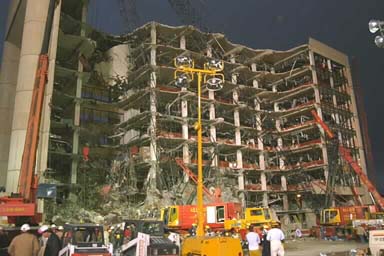Explosions

READY GOV. / Prepare. Plan. Stay Informed.
Terrorists have frequently used explosive devices as one of their most common weapons. Terrorists do not have to look far to find out how to make explosive devices; the information is readily available in books and other information sources. Explosive devices can be highly portable, using vehicles and humans as a means of transport. They are easily detonated from remote locations or by suicide bombers.
Conventional bombs have been used to damage and destroy financial, political, social, and religious institutions. Attacks have occurred in public places and on city streets with thousands of people around the world injured and killed.
Learn what to do if you receive a bomb threat or get a suspicious package or letter.
Devastating acts, such as the terrorist attacks on the Oklahoma City and September 11th, have left many concerned about the possibility of future incidents in the United States.
Nevertheless, there are things you can do to prepare for the unexpected. Preparing for such events will reduce the stress that you may feel now, and later, should another emergency arise.
Taking preparatory action can reassure you and your children that you can exert a measure of control even in the face of such events.
Before an Explosion:
The following are things you can do to protect yourself, your family and your property in the event of an explosion.
-Build an Emergency Supply Kit, which includes items like non-perishable food, water, a battery-powered or hand-crank radio, extra flashlights and batteries. You may want to prepare a kit for your workplace and a portable kit to keep in your car in case you are told to evacuate. This kit should include:
Copies of prescription medications and medical supplies.
Bedding and clothing, including sleeping bags and pillows.
Copies of important documents: driver’s license, Social Security card, proof of residence, insurance policies, wills, deeds, birth and marriage certificates, tax records, etc.
-Make a Family Emergency Plan. Your family may not be together when disaster strikes, so it is important to know how you will contact one another, how you will get back together and what you will do in case of an emergency.
Plan places where your family will meet, both within and outside of your immediate neighborhood.
It may be easier to make a long-distance phone call than to call across town, so an out-of-town contact may be in a better position to communicate among separated family members.
You may also want to inquire about emergency plans at places where your family spends time: work, daycare and school. If no plans exist, consider volunteering to help create one.
Knowing your community's warning systems and disaster plans, including evacuation routes.
Notify caregivers and babysitters about your plan.
Make plans for your pets
During an Explosion:
Get under a sturdy table or desk if things are falling around you. When they stop falling, leave quickly, watching for obviously weakened floors and stairways. As you exit from the building, be especially watchful of falling debris.
Leave the building as quickly as possible. Stay low if there is smoke. Do not stop to retrieve personal possessions or make phone calls.
Do not use elevators.
Check for fire and other hazards.
Once you are out, do not stand in front of windows, glass doors or other potentially hazardous areas.
Move away from sidewalks or streets to be used by emergency officials or others still exiting the building.
If you are trapped in debris, use a flashlight, if possible, to signal your location to rescuers.
Tap on a pipe or wall so rescuers can hear where you are.
If possible, use a whistle to signal rescuers.
Shout only as a last resort. Shouting can cause a person to inhale dangerous amounts of dust.
Avoid unnecessary movement so you don’t kick up dust.
Cover your nose and mouth with anything you have on hand. (Dense-weave cotton material can act as a good filter. Try to breathe through the material.)
After an Explosion:
As we learned from the events of September 11, 2001, the following things can happen after a terrorist attack:
There can be significant numbers of casualties and/or damage to buildings and the infrastructure. So employers need up-to-date information about any medical needs you may have and on how to contact your designated beneficiaries.
Heavy law enforcement involvement at local, state and federal levels follows a terrorist attack due to the event's criminal nature.
Health and mental health resources in the affected communities can be strained to their limits, maybe even overwhelmed.
Extensive media coverage, strong public fear and international implications and consequences can continue for a prolonged period.
Workplaces and schools may be closed, and there may be restrictions on domestic and international travel.
You and your family or household may have to evacuate an area, avoiding roads blocked for your safety.
Clean-up may take many months.
Publications
If you require more information about any of these topics, the following resources may be helpful.
IED Attack Fact Sheet: Improvised Explosive Devices. Document providing preparation guidance for a terrorist attack or similar emergency.
Terrorism, Preparing for the Unexpected. Document providing preparation guidance for a terrorist attack or similar emergency.
Related Websites
Find additional information on how to plan and prepare for an explosion and learn about available resources by visiting the following websites:
Federal Emergency Management Agency
Center for Disease Control and Prevention - Mass Casualty Event
Listen to Local Officials
Learn about the emergency plans that have been established in your area by your state and local government. In any emergency, always listen to the instructions given by local emergency management officials.
Last updated: 05/20/2014 - 01:25 PM






